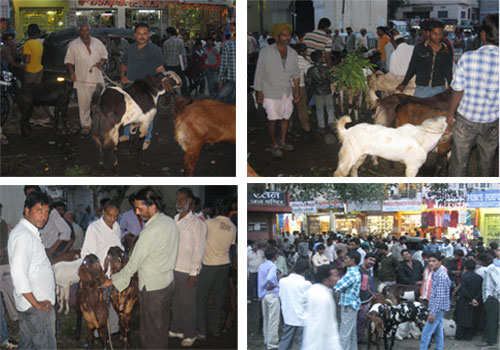Eid Ul Adha – The Festival of Sacrifice
Two months after the major festival of Islam, Eid-ul-Fitr, another special occasion is on the way. This is known as Eid-ul-Adha. In India and neighboring countries it is also called Bakri-Eid because of the sacrifice of animals performed on this day.
This Eid is celebrated in remembrance of Prophet Abraham and the holy message he conveyed. Prophet Abraham was deeply at
Two months after the major festival of Islam, Eid-ul-Fitr, another special occasion is on the way. This is known as Eid-ul-Adha. In India and neighboring countries it is also called Bakri-Eid because of the sacrifice of animals performed on this day.
This Eid is celebrated in remembrance of Prophet Abraham and the holy message he conveyed.
Prophet Abraham was deeply attached to his son Ismail, like every father is. However, for the Prophet, no love or bond was superior to the love for and the strong bond with Allah (God). Once in a dream Prophet Abraham was commanded by God to sacrifice his own son Ismail who was merely 13 years old at that time.
This was a just a test for both father and son to prove their devotion towards Allah and indeed they proved it well. Nor Abraham hesitated in obeying the command nor was Ismail scared of being killed by his own father, simply because it was for Allah.
As soon as Prophet Abraham put the knife over the neck of Ismail, Allah ordered a sheep to take the place of Ismail and said that Abraham’s sacrifice is accepted and that there is no need to kill Ismail.
The whole incident is quoted in the Holy Quran, which Muslims believe are the words of God without any human interference and thus it has a significant value for every Muslim world wide. To commemorate this historically important incident that happened thousands of years ago, Muslims all over the world celebrate Eid-ul-Adha with great respect and utmost dignity.
This incident signifies that a true Muslim is the one who submits himself to the will of Allah and his commands with complete sincerity and obedience. Sacrificing all materialistic things and worldly wishes to attain closeness to the God by making ones soul spiritually strong is one of most important Islamic teachings.
In Islam, human beings are called as Ashraful Makhluqiat which means God’s best and most powerful creature than any other living being in world. As per Islamic teachings, God allowed Muslims to eat the meat of few selected animals only if God’s name was pronounced while taking the life of the animal.
Dhu-al-Hijjah is the last Month of the Islamic Calendar. Eid-ul-Adha is celebrated on the 10th day of this month. It starts just after the completion of Hajj pilgrimage. As said and understood by the story above, Muslims remember this day with the sacrifice Prophet Abraham intended to make. Slaughtering an animal, an act performed by Prophet Abraham, is now a major part of this day and has become a tradition.
This year Eid-ul-Adha will be celebrated on 18th November and Bohra Muslims will celebrate the same tomorrow. There are around 150,000 Muslims in Udaipur of which more than 50,000 will offer their Eid prayers together at the mosque at Chetak Circle.
Like the rest of the world, Muslims of Udaipur also celebrate Eid-ul-Adha with great joy. After performing the Eid Namaz before dawn they greet each other with ‘Eid Mubarak!’ And then starts the act of sacrificing animals mainly goats and sheep. Later they divide the meat in 3 equal portions. One portion of meat is for their own family, second for close friends and relatives and third for the poor and the needy people.
 view of Udaipur Bakra Mandi Hathipol
view of Udaipur Bakra Mandi Hathipol
A strong myth about this day is that by slaughtering an animal on the day on Eid-ul-Adha Muslims can wash away their sins with the blood of animal. However, it is clearly mentioned in the Holy Quran that:
“It is not their meat nor their blood that reaches Allah; it is your piety that reaches Him.” (Qur’an 22:37)
To join us on Facebook Click Here and Subscribe to UdaipurTimes Broadcast channels on GoogleNews | Telegram | Signal


